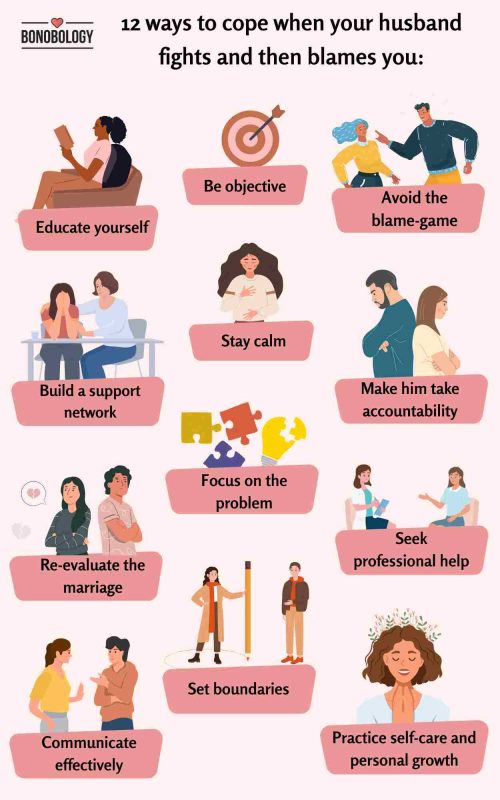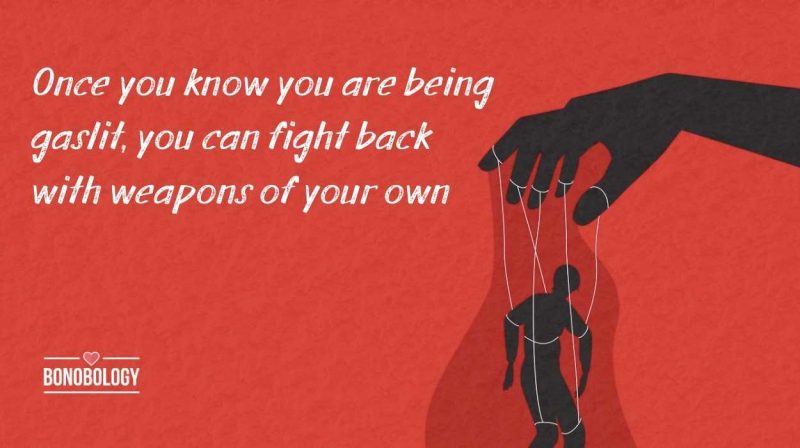It’s said that no healthy relationship is all fun and games, or roses and candle-lit dinners, for that matter. A marriage is a life-long journey full of ups and downs, some of them pretty unpredictable. Nonetheless, when a woman is left wondering, “My husband starts fights and then blames me”, quite often in the marriage, is it really a safe space anymore?
And we’re not talking about a one-off case where a man may have tried to evade responsibility. We’re talking about regular instances of blame-shifting that may leave a good woman complaining, “My husband makes me feel worthless”, or wondering how to deal with a disrespectful husband almost every day. This is one of the signs he is controlling and manipulative and that the relationship lacks a respectful dynamic.
With the help of our relationship counselor Dhriti Bhavsar (M.Sc, Clinical Psychology), who specializes in relationship, breakup, and LGBTQ counseling, we will explore the reasons and effects of such blame-shifting. We will also help you with some tips to deal with this situation and take care of your emotional well-being.
Why Does My Husband Blame Me For Everything? 9 Possible Reasons
Table of Contents
“My husband starts fights and then blames me” – we’ve often found women saying this to their friends and loved ones. Are you too tired of being at the receiving end of all the bickering and blame-shifting in your marriage? Or are you wondering, “Why does my husband blame me for everything?”
You see, an angry spouse doesn’t just pour all their vitriol on you but poisons the relationship too. And if you find your husband always mad at you, you may not be alone. Countless other women are perhaps facing the same situation.
Related Reading: Is My Husband A Narcissist ?
A Reddit user shares how she feels when her husband blames her for everything that goes wrong in the relationship. She says, “He has blamed me in the past for not getting a project at work because I didn’t socialize enough with his seniors’ wives. And also for me suffering from health challenges during pregnancy (I was too weak and unfit to have a healthy pregnancy, according to him). I did overcome those health issues to deliver a full-term healthy baby, and baby didn’t require any NICU stay, etc.”
She then goes on to list a whole lot of other issues he has blamed her for, including his anger issues, his father’s ill health, their daughter’s illnesses, and for calling him at work unnecessarily. If you’re often complaining, “My husband always puts me down”, and wish to find some answers as to ‘why’, here are some underlying issues that may cause your husband to blame you for everything:
1. A fragile ego/sense of self
Often, we find women complaining, “My husband makes me feel worthless”, without realizing that men who do this tend to have an ego issue. You see when a man has a fragile ego, he would often find it difficult to confront his faults and take accountability in relationships.
Dhriti says, “Such people then start deflecting blame onto someone else, as that’s an easier way out, one that is far more acceptable to them than taking responsibility for their actions. This is a common defense mechanism that is known as ‘projection’. But you may be left wondering, “My husband starts fights and then blames me. I have no clue why!” This is a tricky situation.”
Here’s a Reddit user’s experience: “Last night in particular, we hung out at his friend’s (M) place – just the three of us. And throughout the night, there were occasions in which I felt his remarks were really aggressive and mean to me.”
She then goes on to say how he reacted when she confronted him about feeling bad: “…after I told him how I felt, he blew up at me. He got mad at me and started yelling at me about how I wanted to argue with him and about how I needed to respect who he is when he is with his friends and how I also needed to respect their time together.” Here, the man is clearly shifting blame onto his wife to avoid facing his own monsters.
Related Reading: My Husband Is Moody And Angry All The Time – 13 Tips That Work On Cranky Husbands
2. Self-esteem issues stemming from past trauma
If you’re always wondering, “Why does my husband blame me for everything?”, well, self-worth issues can be a major cause. When you find your husband always mad at you, remember, at times, anger can reflect unresolved issues from the past. People suffering from past trauma, or the low self-esteem that originates from such trauma, for instance, trauma from emotional and psychological abuse, find it difficult to ask for help directly.
Dhriti explains, “Even if help is readily available, they may not ask for it because it’s hard for them to be vulnerable out of fear. Hence, they lash out at their partners because of these underlying factors.”

One of my coworkers, Damien, had a tremendous self-esteem issue because he couldn’t live up to the expectations of any of his former girlfriends in bed. He had a sexual problem, which he fixed to a certain extent later, with medical advice. But when he got married a few years later, he would often try to have the upper hand over his wife, sometimes, to the point of demeaning her publicly. It was perhaps his male ego talking, or his way of making up for all the disrespect he received in his past relationships.
3. Tendency to manipulate
If you’re constantly complaining, “My husband always puts me down”, remember, blaming one’s partner or spouse for everything or picking up fights can be a manipulative tendency because it directly attacks the target’s self-confidence. Dhriti explains, “This way, the person getting unfairly blamed loses their confidence and becomes increasingly more dependent on the person who is criticizing them.”
A friend, Clare, shared a similar experience. She said, “My ex-husband, Dave, was quite a manipulative person. I would say, he was narcissistic to a certain extent too. So, he played mind games and often blamed me for things that I had no part to play in. For instance, he once left his wallet at the grocery store, and then blamed me, saying he misplaced it because I distracted him by calling him up when he was there. My husband hurt me deeply almost every day, till a point when I realized his manipulative tactics were the reason for my low self-esteem and decided to part ways.”
Related Reading: Alpha Males In Relationships: Characteristics And How To Deal
4. Perfectionism
Often, when a man is a perfectionist who struggles with managing his own expectations, he might lash out at his partner. Dhriti says, “Such people have unrealistic expectations from not only themselves but others around them as well. So, whenever you fail to live up to their expectations in your relationship, instead of adjusting their expectations to be more realistic, they blame you instead and resort to starting fights.”
Such people often say things like:
- “I’m only saying this for your own good.”
- “This will help you improve.”
5. Stress
When men start fights, there may be underlying issues — they may be going through something stressful and are unable to effectively manage or express their frustration at the actual source. So, they end up developing anger issues and venting their frustration on their partners. Dhriti explains, “This is another defense mechanism, called ‘displacement’. In this case, emotions get displaced from their source onto someone who had nothing to do with the situation in the first place.”
Rita, a friend of mine, related a similar tale: “Till a few months back, my husband would often get irritable at home and blame me for every little inconvenience. My husband hurt me deeply at times. So, if the AC wouldn’t work, it would be my fault, since I use it so frequently. If the bathroom door needed repairs, it would be my fault, since I “bang” the door often. And this went on, till I realized the real reason was that he was being held up for a promotion at work and someone else was taking credit for his work. So, it was all that work stress that was being deviated toward me — the punching bag.”
6. Dissatisfaction with the marriage
Men may become angry at their spouses if they are dissatisfied with the marriage, or have some unresolved issues or underlying reasons that they are not able to share or bring up. Dhriti says, “This can lead to resentment toward the partner and can make them lash out in different ways, one of them being blaming the wife for things unfairly.”
Dhriti dealt with one such client, Shehnaz. She relates, “Shehnaz and her husband, Omar, have been married for ten years and have two young children. Apart from working part-time, Shehnaz also manages most of the household responsibilities. However, of late, her husband blames her for various issues, big and small.
Related Reading: Miserable Husband Syndrome – Top Signs And Tips To Cope
“For example, if the children misbehave, Omar says she’s not disciplining them properly. When there’s financial stress, he accuses her of overspending or mismanaging the budget. Even in social situations, he criticizes her for not being outgoing enough or for saying the wrong things. Shehnaz now finds herself anxious to please him. A lot of this situation is perhaps due to the drabness of the marriage, where Omar is perhaps frustrated with the marriage itself. A little soul-searching to mend the real issues, be it financial stress or sexual dissatisfaction, can resolve this situation.
7. Lack of accountability
When men have a problem with accepting responsibility for their actions, they often tend to gaslight their spouses into thinking it’s all their fault instead. This is one of the signs he is controlling and manipulative. Dhriti explains, “This is common among those who’re not used to taking responsibility or accepting fault in general and hence double down on blaming others around them, mostly their spouses.”
A Reddit user had a similar experience, “So my husband (34) of eight years has a serious issue with taking responsibility for anything. He finds a way to blame me (33) for everything. I have a never-ending list of all the insane stuff he tries to make my fault, even if I’m not present at the time.”
8. Family opinions
Often, men might be influenced by their family members and loved ones to ill-treat their partners. Dhriti explains, “A man’s opinion of his wife may be influenced by his family’s opinions of her. This happens especially frequently in patriarchal households, such as Indian families, where the mother-in-law may have issues with the daughter-in-law. This causes huge rifts in the marriage later.”
Related Reading: My Husband Resents My Success And Is Jealous
She cites a case she recently handled: “Take the instance of Raj and Priya, my clients, who are both in their late 20s. They have been married for five years and live with Raj’s parents. Whenever conflicts arise in their marriage, especially those involving decisions or disagreements with Raj’s parents, Raj tends to blame Priya.
For example, if there’s a disagreement between Priya and Raj’s mother regarding household chores or childcare responsibilities, Raj often takes his mother’s side and blames Priya for not respecting his parents’ wishes.”
9. His controlling nature
When a man tends to find faults with things their partner does on her own or attempts to always have the upper hand, it’s one of the major signs he is controlling and manipulative. Dhriti says, “In such cases, men expect their partners to operate exactly as they say or dictate.” Any deviation from how they expect their partners to behave may start fights, with the man blaming his wife for everything.
Dhriti cites a case. “My client, Annie, and her husband, George, are both working and contribute equally to the household expenses. Despite this, George controls all her decisions and frequently blames her for various issues.
“For example, he insists on making all major decisions without consulting her, including financial matters and plans for their social life. When she expresses her opinions or desires, he dismisses them and accuses her of being unreasonable or irrational. When she tries to assert her independence and express her needs, Mark responds by belittling her. And, as a result, she has now withdrawn from all social activities.”
Effects Of Being Blamed For Everything In A Relationship
Being blamed for everything in a relationship isn’t a minor issue that you can shrug off. It can, in the long run, amount to severe emotional and psychological abuse. And the worst part is, you may be tempted to ignore it and go on because as they say, fights are a part and parcel of every marriage. And all the while, you may be telling your friends, “My husband is angry all the time.”
Related Reading: 12 Things You Should Never Compromise On In A Relationship
But now that you know the answer to the question, “What are the warning signs of an abusive relationship?”, it’s time to get some insights on the effects of an angry spouse on your mental and physical health.
So, if you end up believing in the blame game and start saying, “Everything is always my fault in my relationship”, you can be sure you’ve reached a dangerous level of low self-esteem and that your mental health is at risk of being destroyed. So, be aware of the hazardous emotional impact of such controlling husbands. Our expert Dhriti lists some effects of such a one-sided blame-shifting in relationships:
- Low/poor self-confidence: When your husband starts fights and then blames you often, you may have difficulty trusting yourself to do the right thing. This can result in an overall low opinion of self
- Resentment toward the partner: Your husband’s anger may cause you to resent him, and this may lead to long-term and deep-seated anger toward him. It may also affect mutual respect
- Feelings of inadequacy: When your husband demeans you, you may internalize negative beliefs about yourself that sound like “I am not good enough” or “I do everything wrong.”
- Lack of trust and faith in your partner: Prolonged attacks by your husband may lead you to see them as someone who is always attacking you. You may never picture them as someone who loves you and who you should ideally feel safe around
- Health issues: When your husband shows he’s angry with you, it may lead you to suffer from stress and anxiety. This may very well lead to permanent damage to your health and well-being
- You start walking on eggshells: Since you’re mired in self-doubt, you also end up walking on eggshells around your partner, trying to please him, while also complaining, “My husband is angry all the time.”

‘Everything Is Always My Fault In My Relationship’: 12 Ways To Cope
Are you struggling with unresolved conflicts in your marriage? Or finding it hard to deal with the fact that your partner blames you for everything that goes wrong in the relationship? How do you go from “My husband starts fights and then blames me” to “I have found a solution to the root cause that’s causing him to behave this way”?
Well, our expert Dhriti suggests a number of ways you can cope with this situation of being blamed for everything in a relationship. For instance, she recommends that you set healthy boundaries in the relationship, keep your cool, and focus on seeking guidance if things don’t improve. We’ll take a closer look at the various ways in which you can deal with such a situation. So, this is how to deal with a disrespectful husband:
Related Reading: How To Deal With A Manipulative Husband?
1. Educate yourself
The first step to healing from such a toxic situation where you’re always telling yourself, “My husband starts fights and then blames me”, is learning why people blame others in this manner, and how defense mechanisms work.
Dhriti feels, “This knowledge empowers you, and you don’t fall prey to manipulation later. So, seek answers to questions such as, “What are the warning signs of an abusive relationship?” Be aware that such unhealthy behavior leads to emotional and psychological abuse, and steer clear of encouraging it.”
2. Stay calm
When you’re always thinking, “Everything is always my fault in my relationship”, the best bet is to stay calm. While burying your emotions for a long time isn’t the most recommended way to deal with your husband’s blame game or to improve communication, you must stay calm through it all to maintain your emotional well-being and work toward a conflict resolution plan. Remember, responding to his actions shouldn’t necessarily translate to reacting to it.
Related Reading: My Husband Is Not Affectionate Or Romantic And I Am Tired Of Trying
Dhriti advises, “Your reactions end up giving him power over you. You should look after your emotional health instead so that you don’t get defensive and reactive when this happens. Remember that you get to decide your reality, not anyone else.”
3. Practice setting boundaries
Set clear and healthy boundaries when you’re around him. Dhriti says, “You do not need to accept blame or be passive when your husband treats you in this manner. Choose open communication, in a calm but firm manner that you will not accept blame for things that aren’t your fault. Keep your distance and seek help if you face grave issues, such as domestic violence.”
4. Be objective
Start looking at things as objectively as possible and proportion blame and responsibility. That way, you gain a deeper understanding of the root causes responsible for his behavior and be able to resolve conflicts effectively. Dhriti recommends, “While you do this, stay firmly grounded in your truth, and have that faith in yourself.”
Related Reading: 21 Ways To Make Your Husband Fall In Love With You Again
5. Build a good support system
One of the best ways to deal with spousal abuse is to build a healthy support network. So, be in touch with your friends, family, coworkers, and loved ones. Dhriti says, “Engage in activities with them that make you feel safe and happy.” Remember, seeking support is a healthy coping mechanism.
6. Encourage your husband to take accountability
It’s always a good idea to sit down and talk things out. Open and honest communication has no alternative. And while you’re at it, the most important bit is to make him realize his own mistakes and the gravity of your hurt feelings. Dhriti says, “You can try making him understand how his actions are impacting both of you and your marriage.”

7. Avoid throwing blame back
Dhriti believes, “When trying to get someone to take ownership, attacking them or pointing fingers at them is not the answer. Try approaching from a place of understanding and curiosity instead. Mutual respect is necessary to resolve conflicts in a healthy manner.” So, here’s what you shouldn’t do:
- Pass judgment on your partner
- Make negative or passive-aggressive remarks
- Ridicule him or be sarcastic
- Make him feel guilty
- Be abusive
- Make him seem like the ‘bad person’
8. Find solutions by focusing on the problem
Remember, it’s not you against your partner. If you wish to sort things out, you need to make it a you and your partner vs the problem scenario. Encourage open communication and have an honest conversation about the underlying factors, to find solutions. Ask him to go through some self-reflection. Dhriti says, “If your partner gets stuck in a cycle of placing blame, redirect the conversation to brain-storming a solution together.”
Related Reading: 9 Signs Of An Unhealthy Relationship
9. Focus on self-care and personal growth
Dhriti says, “One of the most important steps toward healing from or dealing with such a situation is to prioritize your own happiness and adopt self-care and personal well-being.” Here are some tips on how to do it:
- Shift focus to your hobbies: Be it dance, art, journaling, or photography, take time out to do what you love doing
- Learn something new: Join a foreign language class or a Zumba workshop. Learn a new skill for some self-development and personal growth
- Spare some time to pamper yourself: Go for a spa session or splurge on clothes. Look good and feel good for yourself
- Unwind by being amid nature: Go for a solo trip to the beaches or the mountains. Meet like-minded people at hostels or homestays
10. Re-evaluate the marriage
Take some time to reflect on your marriage. Sit down and jot down points, if that helps. Weigh the pros and cons of being in your marriage and ponder over whether it’s a good idea to stay or to leave. Dhriti says, “Sometimes holding on is more harmful than letting go.”
Related Reading: 13 Ways To Make Him Realize Your Worth
11. Practice effective communication
At times, letting a person know how you’re feeling is all that’s needed but that’s the only thing that remains unsaid and unheard. So, practice effective communication. Here’s how you can do that:
- Instead of avoiding your husband when he’s angry, show him you wish to discuss issues
- Text or call, in case you need to maintain physical distance
- Don’t give him the silent treatment or accept stonewalling
- Avoid passive-aggressive behavior such as turning on the TV or slamming the door shut when he’s talking

12. Seek professional help
And if all else fails, and you are still clueless as to how to fix the “My husband starts fights and then blames me” issue, Dhriti has this to say to you: “To address a situation where your partner is constantly blaming you for no reason, in spite of all your efforts to fix his behavior, seek professional help and opt for individual counseling or couples therapy. It can go a long way in improving your mental health.” Seeking support doesn’t make you look weak. You can always reach out to Bonobology’s expert counselors for more help.
Key Pointers
- Reasons why your husband may be placing blame on you for everything can include: past trauma, stress, lack of accountability, a fragile ego, and the tendency to manipulate and make you feel guilty
- The effects of being blamed for everything may include health issues, lack of trust, and low self-esteem
- To deal with this situation, you can practice setting healthy relationship boundaries, be objective, focus on problem-solving, and seek professional help by opting for couples therapy or individual counseling
We’re sure, by now, you must’ve realized that being blamed for everything in your marriage isn’t because you are at fault. If you often think to yourself, “My husband starts fights and then blames me,” remember, it hints at deep-seated issues of your partner, such as past trauma or the habit of not taking responsibility for their actions.
Nonetheless, apart from trying your best to resolve this issue, don’t shy away from maintaining your composure and taking care of your mental health. Remember to step back and reconsider your marriage, if need be. Also make sure you’re having a good time in your own life because as they say, life is too short to fret over anything. So, if it doesn’t bring you joy in the long run, despite your best efforts, don’t hesitate to stay away from your marriage.
6 Couples’ Experiences On How Talk Therapy Helped Their Relationships
9 Things To Do When Every Conversation Turns Into An Argument
Your contribution does not constitute a charitable donation. It will allow Bonobology to continue bringing you new and up-to-date information in our pursuit of helping anyone in the world to learn how to do anything.























Numele meu este Lilian N. Aceasta este o zi foarte fericită din viața mea datorită ajutorului pe care mi l-a oferit Dr.saguru, ajutându-mă să-mi recuperez fostul soț cu vraja lui magică și de dragoste. Am fost căsătorit de 6 ani și a fost atât de îngrozitor pentru că soțul meu chiar mă înșela și dorea să divorțeze, dar când am dat peste e-mailul Dr.saguru pe internet despre cum a ajutat atât de mulți oameni să-și recapete fostul și să ajute. pentru a repara relația. și îi face pe oameni să fie fericiți în relația lor. I-am explicat situația mea și apoi i-am cerut ajutorul, dar spre surprinderea mea, mi-a spus că mă va ajuta cu cazul meu și iată că acum sărbătoresc pentru că soțul meu s-a schimbat total definitiv. Întotdeauna vrea să fie lângă mine și nu poate face nimic fără cadoul meu. Îmi place foarte mult căsnicia mea, ce sărbătoare grozavă. Voi continua să testez pe internet pentru că Dr.saguru este cu adevărat un adevărat vrăjitor. AI NEVOIE DE AJUTOR ATUNCI CONTACTATI ACUM DOCTORUL SAGURU PRIN EMAIL: [email protected] El este singurul raspuns la problema ta si te face sa te simti fericit in relatia ta. și este, de asemenea, perfect în 1 Vraja de IUBIRE 2 CÂȘTIGĂ EX-ÎNAPOI 3 FRUCLE PANTECULUI PROMOVARE 4 VRAJI 5 PROTECȚIA VRAJILOR 6 Vraja de afaceri 7 Vraja de MUNCĂ BUNĂ 8 Vraja de loterie și Vraja de caz de instanță